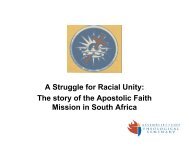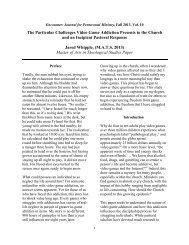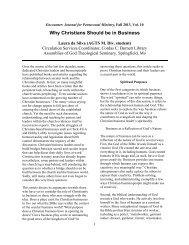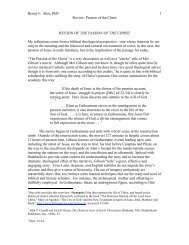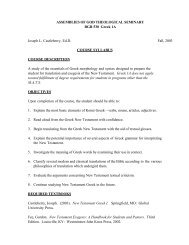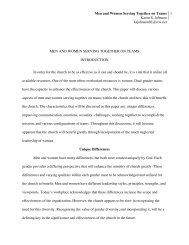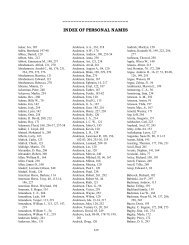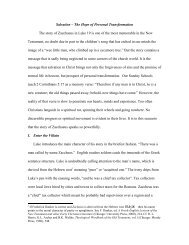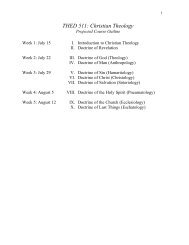Encounter: Journal for Pentecostal Ministry - Assemblies of God ...
Encounter: Journal for Pentecostal Ministry - Assemblies of God ...
Encounter: Journal for Pentecostal Ministry - Assemblies of God ...
You also want an ePaper? Increase the reach of your titles
YUMPU automatically turns print PDFs into web optimized ePapers that Google loves.
lessing in her lowly state (v. 48), exalting<br />
those <strong>of</strong> inferior status (v. 51-56), and filling<br />
the hungry with good things along with<br />
sending the rich away empty (v. 51-53). 42 In<br />
the first chapter <strong>of</strong> Luke, the reader is<br />
already given a clear indication through<br />
Mary‟s song that the poor are chosen <strong>of</strong> <strong>God</strong><br />
and are promised His rewards.<br />
Perhaps the passage <strong>of</strong> greatest significance<br />
in Luke‟s Gospel where the poor are<br />
specifically mentioned is in 4:18-21. In this<br />
particular passage, Jesus has just returned to<br />
His hometown <strong>of</strong> Nazareth after being in the<br />
wilderness <strong>for</strong> <strong>for</strong>ty days during His<br />
temptation. He reads from the scroll <strong>of</strong><br />
Isaiah and quotes Isaiah 61:1-2 which states,<br />
“The Spirit <strong>of</strong> the Lord is on me, because he<br />
has anointed me to preach good news to the<br />
poor. He has sent me to proclaim freedom<br />
<strong>for</strong> the prisoners and recovery <strong>of</strong> sight <strong>for</strong><br />
the blind, to release the oppressed, to<br />
proclaim the year <strong>of</strong> the Lord‟s favor.” Jesus<br />
then tells those listening, “Today this<br />
scripture is fulfilled in your hearing” (v.20).<br />
This statement is the reader‟s first clue that<br />
<strong>God</strong> gives the poor the priority <strong>of</strong> the gospel<br />
message. This same passage, also found in<br />
Matthew‟s Gospel, confirms that <strong>God</strong>‟s<br />
special interest in the poor stems from the<br />
Old Testament idea <strong>of</strong> <strong>God</strong>‟s care <strong>for</strong> the<br />
poor. 43 This specific passage is extremely<br />
significant because it provides the four<br />
major emphases <strong>of</strong> the programmatic text<br />
<strong>for</strong> Luke‟s writings: (1) the announcement<br />
<strong>of</strong> Christ‟s ministry as the fulfillment <strong>of</strong><br />
<strong>God</strong>‟s salvation-time, (2) a statement giving<br />
the content <strong>of</strong> Jesus‟ ministry based on the<br />
Isaiah quotation, (3) the <strong>for</strong>eshadowing <strong>of</strong><br />
Jesus‟ suffering and rejection, and (4) the<br />
<strong>for</strong>eshadowing <strong>of</strong> the gospel movement<br />
from Jew to Gentile. 44<br />
Pilgrim states that the phrase “good news to<br />
the poor” in this particular passage might be<br />
understood as introducing and directing the<br />
7<br />
following lines in which the concept <strong>of</strong> the<br />
“poor” categorizes the captives, blind, and<br />
oppressed. 45 As previously stated, the firstcentury<br />
concept <strong>of</strong> the poor may not<br />
necessarily be limited to those <strong>of</strong> low<br />
economic standards. Davids confirms that<br />
the poor referred to in this passage,<br />
however, are the “people <strong>of</strong> the land” (am<br />
hā āres) to whom He also sends His<br />
disciples in Matthew 10:6-7. 46 One scholar<br />
concludes that the poor in Luke‟s context<br />
are put in Old Testament terms as those <strong>of</strong><br />
both social and religious humility, and that<br />
Jesus‟ programmatic proclamation confirms<br />
His fulfillment <strong>of</strong> Isaiah‟s prophecy <strong>for</strong> the<br />
deliverance <strong>of</strong> the spiritually, physically,<br />
socio-politically, and psychologically<br />
oppressed. 47 Although this passage does not<br />
specifically address the economically poor,<br />
one can conclude that people burdened<br />
financially were <strong>of</strong> high priority in Jesus‟<br />
message <strong>of</strong> freedom and deliverance.<br />
Contrast between the Rich and the Poor<br />
Luke 6:20 and 24 provides an excellent<br />
example <strong>of</strong> Jesus‟ contrast between the rich<br />
and the poor during the giving <strong>of</strong> “the<br />
Beatitudes.” He first admonishes the poor by<br />
stating in verse 20, “Blessed are you who<br />
are poor, <strong>for</strong> yours is the kingdom <strong>of</strong><br />
<strong>God</strong>…” while specifically looking at His<br />
disciples. A few verses later (6:24), He<br />
contrasts this statement with His warning to<br />
the rich, “But woe to you who are rich, <strong>for</strong><br />
you have already received your com<strong>for</strong>t….”<br />
Due to <strong>God</strong>‟s overarching love <strong>for</strong> all<br />
people, one cannot conclude that Christ<br />
despises the rich; however, one can see His<br />
displeasure with the oppression <strong>of</strong> those who<br />
base their status on riches and squander their<br />
wealth on personal gain.<br />
Jesus expresses obvious concern <strong>for</strong> the<br />
salvation <strong>of</strong> the economically rich as well as<br />
the poor. However, in Luke, He seems to



